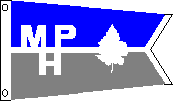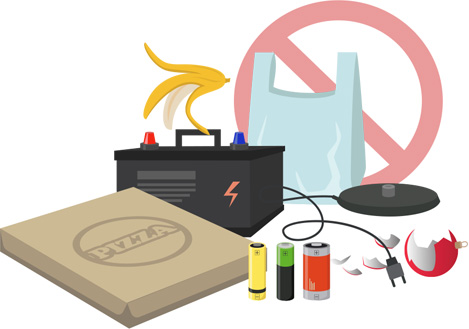Marina Recycling
RECYCLE RIGHT MEANS “CLEAN” RECYCLING
So what can I recycle?
While recycling is the first step in the process, it’s important to put materials in the cart or bin that actually belong there. Most importantly, we need your help to reduce the contamination of clean recycling materials by separating those with organic material on them. Know before you throw! Always check your local municipality for your individual recycling guidelines. Please visit AdvancedDisposal.com/find-a-facility.aspx
ACCEPTABLE ITEMS:
Cardboard
(Yes, all those Prime boxes!)
Paper
(Office paper, brown paper bags, mail, etc.)
Aluminum Cans, Metal Containers
(After being quickly rinsed)
Plastic Bottles, Jars, Jugs and Containers
(After being quickly rinsed)
UNACCEPTABLE ITEMS:
Any Plastic Bags
Tanglers
(No wires, holiday light strings, hoses, cords, etc.)
Food Waste or Liquids
(Organic material)
Batteries
(All types, especially lithium)
Safe Sharps
(Any needle, syringe, blade, etc.)
COMMON RECYCLING MISTAKES
These are commonly mistaken items that often show up in recycling carts and bins, but they CANNOT BE RECYCLED AT YOUR CURB. Please don’t toss these in with your recycling.
Plastic Grocery Bags
These are the most common items in the bin or cart that shouldn’t be there, and they can be the most detrimental. When they get caught in the recycling sorter, they have to shut the whole system down and manually pull them out. Instead, consider recycling them by taking them back to the grocery or pharmacy, or big box stores where there are specially designated bins for recycling plastic bags.
Polystyrene (Styrofoam)
Although Styrofoam is recyclable, it requires highly specialized equipment that single stream recycling facilities are not equipped with. Some restaurants (such as Chick-fil-A) accept their own Styrofoam cups for recycling.
Take-Out Containers & Donut Boxes
Food residue can contaminate the boxes or other recyclable material. They can only be recycled if free of food waste and residue from food (think cheese from pizza).
Paper Coffee Cups
Although often thought of as a better alternative to Styrofoam, paper cups pose issues to recycling as well due to the plastic coating applied to prevent leaking. Your best bet is to bring your own mug!
Automotive Parts & Scrap Metals
These are too large and cumbersome for recycling equipment and could cause injury.
Baby Diapers
The plastic from them cannot be salvaged. Plus it’s just plain gross!
Pizza Boxes
This is one of the most common recycling mistakes. Although they are made of cardboard, the grease from the pizza contaminated the raw material. You can tear off the untarnished parts and recycle them though!
Wet Paper
Paper that has gotten wet can make recycling difficult or impossible. Take care to cover your recyclables to keep them safe from the elements. Wet paper should be discarded with the trash.
Milk & Juice Cartons
These are often coated with a thin layer of wax but can still be recycled by many (but not all) communities. Best bet is to check with the local municipality, hauler or recycler to see if these can be recycled.
Aerosol Cans
While these are made of metal, because of the chemicals used to pressurize the cans, they are classified as household hazardous waste and should be discarded as such – not with recyclables or with the garbage.
Ceramics & Pottery
This includes things like coffee mugs and old flower pots. Look into donating items like this if they are in alright shape, someone else may be able to reuse them!
Shredded Paper
Shredding paper reduces its size so dramatically that it ends up mixed with the residue or glass at recycling facilities. Because the machines sort broken glass and other debris by size, the shredded paper often gets destroyed or disposed of because it ends up in the wrong place. Once it is mixed with glass or residue, it cannot be recovered for recycling.
Household Glass
Items like window panes, mirrors, light bulbs, and dishes are dangerous and should be left out of your recycling. Light bulbs can be recycled at many hardware and home improvement stores. Dishes, if not broken, can be donated to local charities.
Paint, Pesticides, Automotive Fluids, Diesel Fuel, Gasoline, Kerosene & Car Batteries
They cannot be accepted and should be disposed of at a hazardous waste disposal facility.
Hypodermic Needles
At one time, people were told that it was safe to put needles into a plastic bottle. It is not safe. Our workers can be exposed to grave illness and blood borne diseases. People need to properly dispose of used needles.
THE WORST CONTAMINANTS YOU CAN PUT IN YOUR RECYCLING CART/BIN
The following items generate the most contamination of your clean recycling materials. Please avoid including these items at all costs!
Any Food Waste and Liquids (This includes containers with any organic residue!)
Take-Out Containers (foam products), Pizza Boxes, and Donut Boxes
Any Plastic Bags (They get caught up in all the machinery)
Holiday lights, wires, or hoses (Anything that can get tangled)
Batteries (Especially lithium!)







